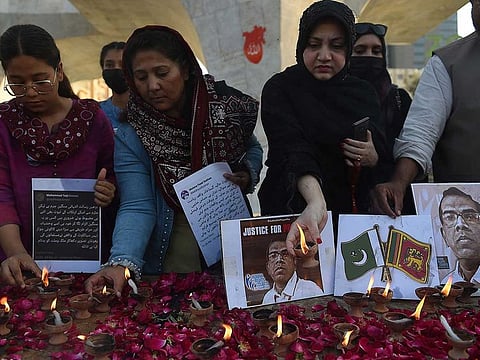Mob lynching in Sialkot horrific, condemnable
Pakistan under Imran Khan is a country that is trying to move ahead

Last week in the city of Sialkot in northern Pakistan, a 48-year-old Sri Lankan factory manager was dragged out into the street and killed by a mob claiming that he had carried out what they termed as blasphemous acts. The victim, who had come to Sialkot to forge a living left behind his wife, and two sons, aged 14 and nine.
Now northern Pakistan has many provincial elements, and one of them is deep conservative convictions that if and when manipulated wisely can lead to the desired results of the manipulator. And that seems to be exactly what happened in the unfortunate tragedy. Workers who were not doing their jobs properly and were being called to task for their negligence banded together and framed the man. Exhorting others did not take much time and the hapless fellow was shoved onto the streets by a feverish mob where he met his gruesome fate.
It was an act that shocked the nation, and one that brought immediate condemnation from Prime Minister Imran Khan who called it a horrific act that brought shame to the country. In a message on Twitter PM Khan wrote, “The horrific vigilante attack on a factory in Sialkot and the burning alive of Sri Lankan manager is a day of shame for Pakistan.” He immediately set the legal apparatus to find and apprehend al those responsible for this act and promised that no guilty individual would walk over this crime.
The incident also drew and immediate response from Pakistan’s military who issued a statement condemning the “cold-blooded murder.” “Such extrajudicial vigilantism cannot be condoned at any cost,” it said. It also vowed its commitment to providing full support to the agencies investigating the event and helping bring the responsible parties to justice.
A statement by the Pakistani police following the tragedy said that they had arrested a total of 131 individuals. “These include those involved in planning the attack on the Sri Lankan manager, as well as those who tortured him and those who incited others,” read the statement.
It was encouraging to see the nation’s leaders react strongly to the incident. That said it still remains a horrific act that deserves complete investigation and rebuttal in the strongest terms.
Pakistan under Imran Khan is a country that is trying to move ahead under years and years of economic stagnation. Decades of corruption have also given rise to self-serving elements whose interests are more geared towards personal power than national interests.
One of them is the far-right extremist political parties in Pakistan whose followers frequently resort to violent and deadly protests that recently saw at least seven police officials killed and dozens wounded, as protesters blocked major roads and a highway in and around Lahore.
Mobs can quickly be exhorted to dastardly deeds. This is not something that happens only in Pakistan. It happens even in the bible-belt of the United States.
I’ve always contended that in today’s times religion and politics are two separate entities and one should not be used to marshal the other.
Under PM Khan Pakistan is going in the right direction. The country must keep a curb on extremist elements and punish those who take law in their own hands.
Tariq A. Al Maeena is a Saudi sociopolitical commentator. He lives in Jeddah, Saudi Arabia. Twitter: @talmaeena



